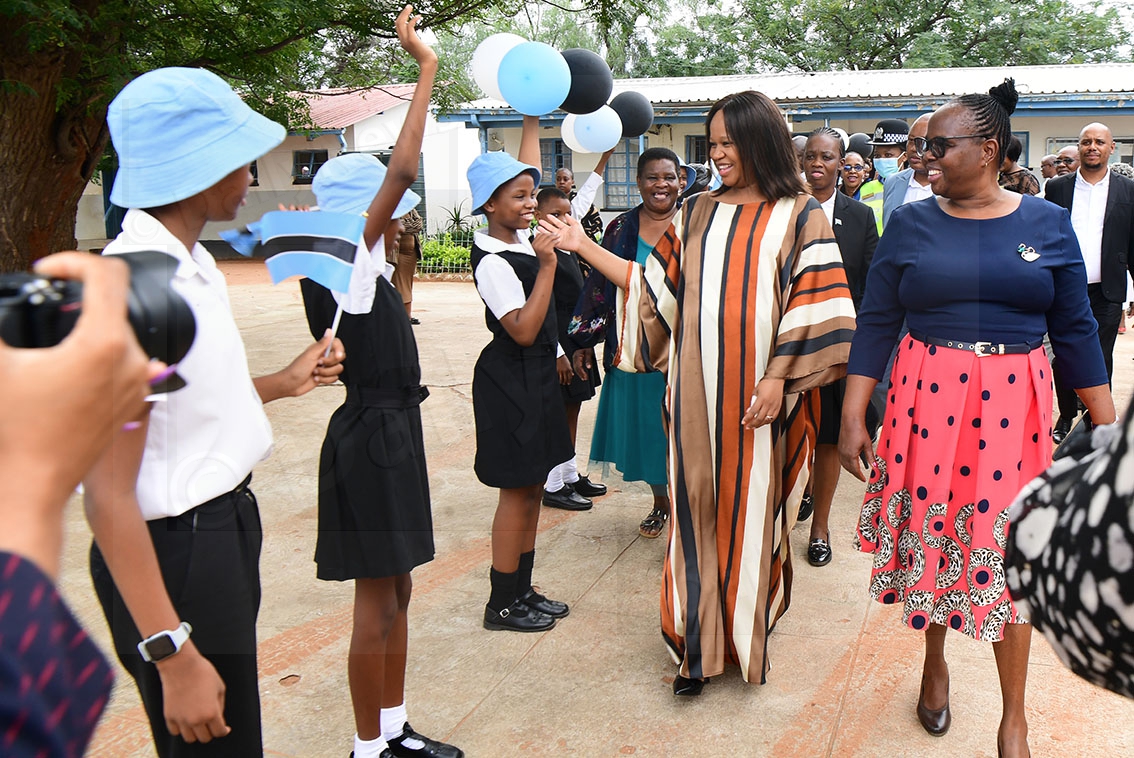Support children with special needs
26 Feb 2025
First Lady Kaone Boko has expressed concern over the lack of action accompanying the signing of conventions and policies aimed at the full inclusion of children with special needs.
Speaking after her visit to Batlokwa National Primary School special education unit yesterday, she highlighted gaps in resources and support for the vulnerable children.
During her visit, Ms Boko observed that insufficient measures had been implemented to support children with special needs, urging the welfare ministry to improve their efforts in addressing these critical issues.
She highlighted her passion for the mental and physical well-being of children, citing that some pupils at the school relied on wheelchairs, yet facilities like restrooms were not adequately designed to accommodate them.
Ms Boko also toured the Central Resource Center for Special Education (CRC) and observed that lack of resources has resulted in delays in conducting timely assessments for pupils.
This, in turn, she said affected timely school enrollment for the children.
She expressed her gratitude to special education teachers for their dedication to the learners.
As part of her visit, Ms Boko donated food hampers, blankets, toys, a microwave, a printer, sewing machines and materials, and a washing machine to the Batlokwa Special Education Unit, the CRC and victims of recent floods.
She appealed to the community to unite in supporting children with special needs, stressing the pressing need for improved resources and facilities. In addition to her visit to the Batlokwa National School and CRC, Ms Boko also paid a courtesy call on Kgosi Puso.
In an interview, Ms Tebogo Baatlhotse, head of special needs at Batlokwa National Primary School, said that the unit enrolled 35 boys and 12 girls, aged five-and-a-half to 12, across five classes with a teacher-student ratio of one teacher for every ten pupils.
Ms Baatlhotse explained the structure of the classes, adding that the beginners’ class provides essential stimulation for pupils aged 5–8, focusing on fine motor skills and daily living skills.
She said students were then promoted to the second stage, which caters to ages eight –12.
“This critical stage allows for assessment, with successful students advancing to non-special needs classes.
So far, five pupils have been promoted to mainstream education. Those who struggle academically transition to a prevocational class for ages 14–22 and beyond.”
She said the unit follows a standard curriculum, adapting objectives to suit the needs of special students, covering six subjects.
Prevocational training includes skills in beadwork, art, textiles, and gardening, though culinary lessons have yet to begin due to a lack of resources.
Ms Baatlhotse said that the school had successfully transitioned 29 professionals into the workforce since 2015 through partnerships with local institutions like Gaborone Technical College, Re Ka Kgona and Tlamelong.
Providing an overview of CRC operations, Acting Director of Learner Support in the Ministry of Child Welfare and Basic Education, Ms Rejoice Ramokate, said the center focused on conducting comprehensive assessments for children with special needs.
She reiterated the necessity for more resource rooms, personnel, adaptive technology as well as the urgent restoration of the hydrotherapy pool.
Mr Peter Choto, the regional director under the Child Welfare Ministry, said that CRC currently served 1032 pupils, exceeding its original capacity of 840. He stressed the urgent need for facility upgrades to alleviate overcrowding.
Despite these challenges, Mr Choto remained optimistic, stating that the commitment of the students drive their success and lays the foundation for a brighter future. ENDS
Source : BOPA
Author : Ndingililo Gaoswediwe
Location : GABORONE
Event : visit to Batlokwa national primary school
Date : 26 Feb 2025







